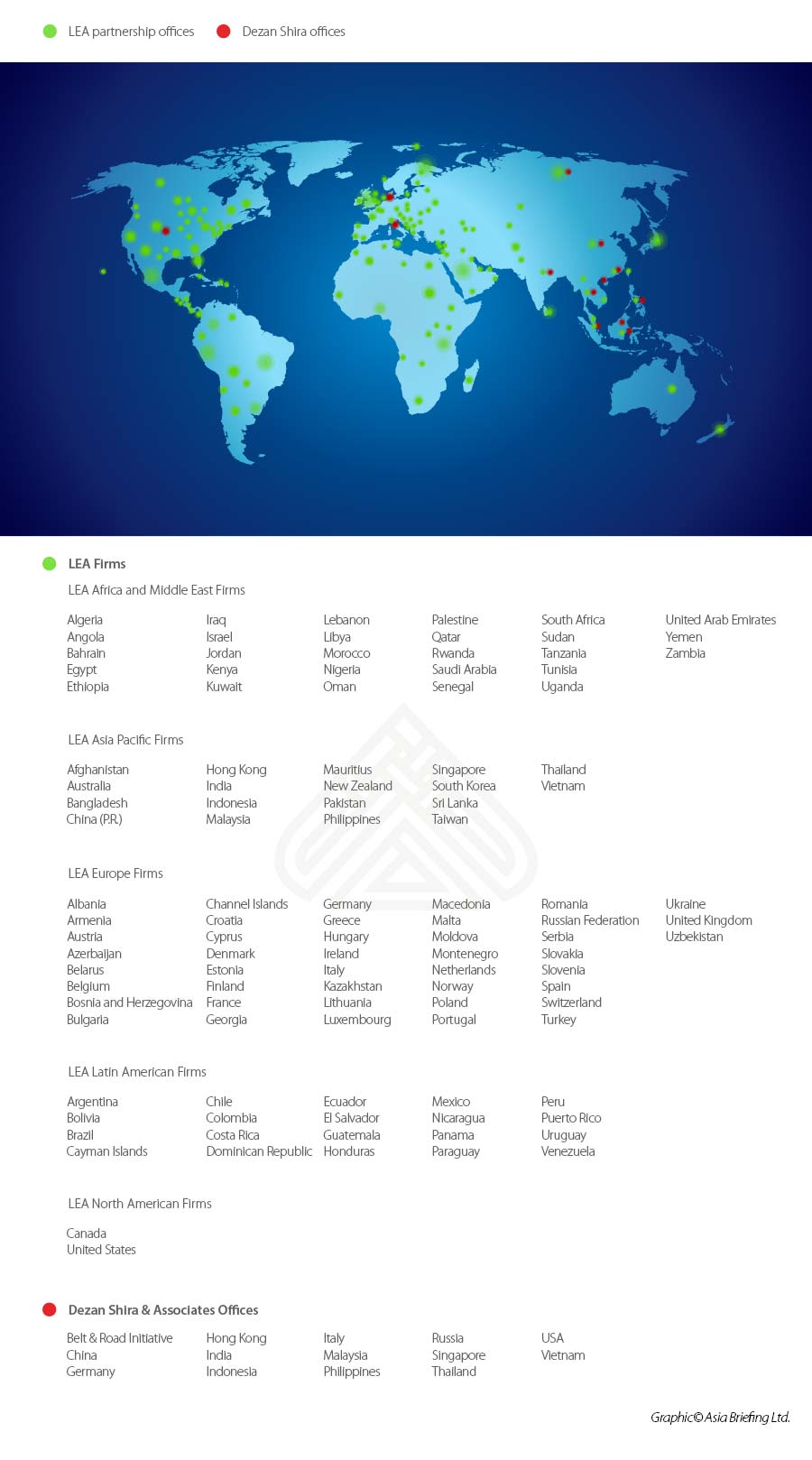Dezan Shira & Associates – The China Belt And Road Initiative Legal / Tax Practice
China’s Belt And Road Initiative has been a great success with many countries and territories – some 152 nations, including many in Europe, Central and South America, Africa, and especially South and South-East Asia have all signed off MoU.
Our firm, Dezan Shira & Associates is now in its 28th year of operations in China, with now 12 offices throughout mainland China and another in Hong Kong. We specialize in assisting foreign investors, and help with market research issues (cost comparisons very much part of this) negotiate contractual and financial terms, in addition to corporate establishment issues, tax advisory matters including the use of Bilateral Investment Treaties and Double Tax Agreements, in addition to other business aspects such as IP, IT, HR, and payroll matters.
Outside China we have our own offices throughout ASEAN, in addition to client liaison offices in Europe and the United States. We are also members of the Leading Edge Alliance a global network of over 220 firms, with 607 offices, and 27,000 staff across 110 countries. That gives us the ability to match local expertise and regulatory issues around the world with our own knowledge of China. It is, in many ways an unmatched base of intelligence that fits right in with the professional standards and intellect needed to handle China’s Belt and Road Initiative, which by proxy is a bilateral undertaking. Getting involved requires knowledge from both sides – the Foreign Domestic partner and the Chinese.
To deal with this, we established Silk Road Briefing, now entering its fourth year. We are now the most prominent and informed website source on the Belt and Road Initiative, combining news along with market intelligence, regulatory, legal and tax issues. We also publish China Briefing, now in its 21st year and a major independent source of China legal and tax matters. These two websites, combined with our global reach, is of immense value to foreign Governments and businesses looking at getting involved in China’s Belt & Road Initiative.
Our global network can be seen here. Red dots belong to our practice, green ones to our Alliance partner firms. As can be seen, that covers much of the Belt & Road Initiative as well as major economies throughout the United States, Canada, EU and Australia. Wherever a dot is represents our global reach.
In terms of global reach and expertise then, our firm is a major player. But what sort of services do we usually get asked to provide along the Belt & Road?
Government To Government Advisory
Much of the Belt and Road Initiative financing so far has been between Chinese and Foreign Governments, yet these require experienced heads to deal with, and a profound knowledge of Chinese laws. While China’s Belt Road MoU are usually fairly standard, non-committal documents, they can take on serious legal ramifications if entered into on a commercial basis – Chinese law regards them almost as a promissory note. Care must be taken when signing these off. Also of note are G2G financing contracts – foreign officials, especially those in smaller nations, may not always be familiar with such contracts. We have seen mistakes in these such as agreeing to fixed interest rates, (the general trend is for interest to be falling or even near zero), exchange rate calculations, and mistakes made over timescales. If your local officials are not well versed in Chinese contractual law and terms, it is better to have someone take a look at it in an advisory role. Getting G2G finance deals wrong can mean mistakes of millions of dollars being made.
Bilateral Contracts – Chinese State Owned Enterprises and Foreign Domestic Companies
There are many ways in which contracts can manifest themselves, but all will require a level of both domestic laws and taxes in the Belt & Road partner nation, and with Chinese laws and regulations. Bilateral contracts in any form require a bilateral approach to issues such as arbitration, foreign exchange, applicable investment treaties, financing terms, banking, identification of responsible persons, employment laws, tax considerations, profits repatriation and many others dependent upon the specific scenario. Then there are issues such as dealing with interruptions, exit strategies, and settling up accounts. Legal and tax knowledge in both the foreign and Chinese jurisdictions are required.
China Procurement Contracts
Foreign companies can also, from 1st January 2020, apply to take part in Chinese procurement as a result of introduced changes to China’s Foreign Investment Laws. We wrote about this in the article Preparing Foreign Investors For Procurement In China Belt & Road Projects But what are the applicable qualifications? Application procedures? Terms? You need intelligence and assistance in China to answer these questions.
China Belt & Road Business Intelligence
What investment contracts are coming down the pipeline? In what sectors? How Can a Foreign business get involved? What about taking advantage of newly built infrastructure after it has been built? New opportunities await businesses if new infrastructure such as roads, bridges, rail, ports and airports come online. But where are they? Our firms Business Intelligence Unit advises foreign governments and businesses. If you need to know what’s going on and where – you need assistance from people who know what is going on and when.
The United States, EU and Belt & Road Business Intelligence – Exploiting The Infrastructure
This is especially true of businesses in the United States. Although the US is not a signatory to the Belt and Road Initiative, it is estimated that the United States is the second largest beneficiary of BRI projects – after China. Why? Because China built the infrastructure. But anyone can use it. With much needed, Chinese financed projects taking place throughout South America and other countries where the US has a significant trade presence, such intelligence enables savvy US businesses to take advantage of the China build. The BRICS nations for example, while related to the BRI although not part of it, have announced they intend to significantly increase trade. That has implications for Mercusor and US businesses involved in bilateral trade with companies from that bloc. The IMF has projected that the BRICS nations will account for over 50 percent of global GDP by 2030. American businesses are well positioned to exploit the infrastructure being built now and the increasing trade opportunities that will result. But where are those opportunities?
The same is true of the EU. Massive infrastructure build is taking place, and especially just across the borders of the EU in Eastern Europe, the Balkans, and Russia. The politicians don’t like it, but the roads, bridges, hi-speed rail connectivity, improved port and airport capacity are being built and will outlast any Euro politicians career. With the Eurasian Economic Union occupying a geographic space between the borders of the EU and China, and with China currently negotiating tariff reductions with the EAEU having signed off an FTA last year, there are opportunities for EU businesses to invest in factories and production within the EAEU itself. And with Chinese invested Special Economic and Free Trade Zones springing up in places like nearby Vitebsk and Minsk, there are opportunities for EU businesses to establish subsidiaries in countries such as Belarus, Kazakhstan and Russia. Doing so gives the advantage of selling not just to the EAEU but also potentially to China – when they finalize their EAEU tariffs negotiations – without having to wait for a EU-China trade deal to emerge.
There are thousands of ways in which business opportunities are now developing and becoming more accessible when looking at what is happening with China and its Belt and Road Initiative. There are very few advisory firms however capable of servicing the need for business intelligence as well as follow that up with experienced, global professional services in the related legal, tax and operational considerations. Dezan Shira & Associates are one of them. Contact our Belt & Road Advisory Desk at silkroad@dezshira.com
Related Reading
- First Baltic Direct Belt & Road Train Reaches Poland’s Gdansk Port
- Free Trade Zones Linking China, Russia & The Eurasian Economic Union
- Key Logistics Hubs Along Russia’s Meridian Road
About Us
Silk Road Briefing is written by Dezan Shira & Associates. The firm provides strategic analysis, legal, tax and operational advisory services across Eurasia and has done since 1992. We maintain 28 offices throughout the region and assist foreign governments and MNC’s develop regional strategies in addition to foreign investment advice for investors throughout Asia. Please contact us at asia@dezshira.com or visit us at www.dezshira.com







